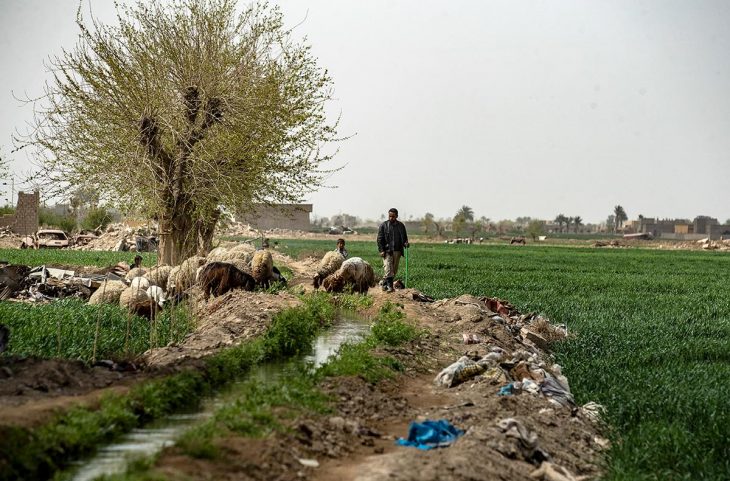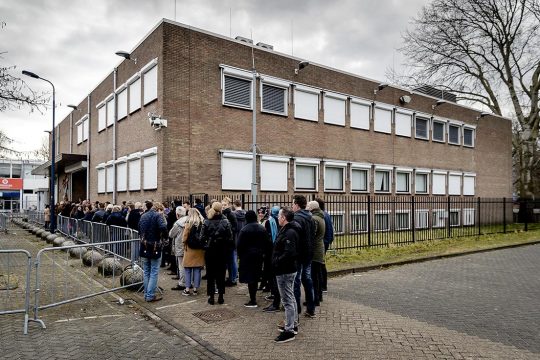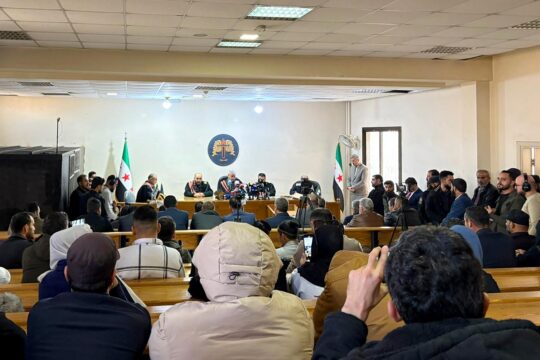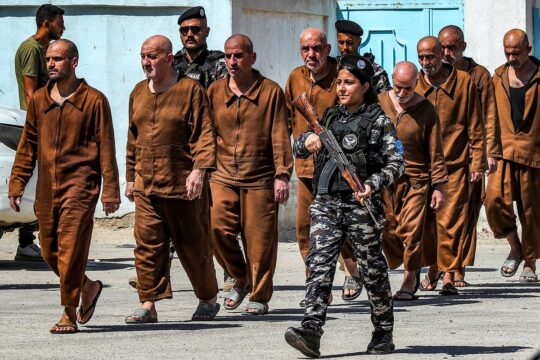Al Mohassan, 10 July 2012. A clique of men sits in an extended pick-up truck. The guys are edgy and excited. Except Qussai Mahmoud Al Ali. Sitting mid-row, he glares down. His face is dotted with black spots and contusions. He is ridiculed because he is Alawite, the ethnic group of Syrian president Bashar al-Assad. Ahmad Al Khedr, who is behind the wheel, pulls over at a rubbly school building. Joined by another group, they march Al Ali over a cracked concrete courtyard, heading to a river bank.
Al Ali balances on his feet in the Euphrates. “Can I pay you money?” he asks. “15…?” Al Khedr retorts: “15 million is not worth a blood drop of the children killed in Deir ez-Zor, Homs, Al Houla or everywhere.” Then somebody yells “yalla”. Al Khedr fires a bullet past Al Ali’s head, another man discharges a Kalashnikov. Audible are 26 shots and a “Allah Akbar”. Al Khedr’s emptied revolver clicks twice. The viral video is titled “the execution of the traitor officer Qussai Mahmoud Al Ali at the hand of Ghuraba’a Mohassan, and Izz ad-Din al-Qassam brigades”.
“Either you are killed, or you go to prison”
Al Mohassan is located in the region of Deir ez-Zor, a cyclic atrocity crime scene. During World War I, the Ottoman Pashas starved Armenians in its deserts; from 2003, the US-American occupation of Iraq drove many purged Iraqi officials and jihadis into the region; since 2011, it has been a hotbed of violence between a myriad of armed factions and the Syrian army. By then Airforce Lieutenant-Colonel Al Ali worked with the State while Al Khedr, who had been in the government’s army before, was now fighting with the opposition – meandering between the Ghuraba’a, the Free Syrian Army (FSA) and Al Qaida associates.
Al Khedr fled Syria in late 2013. When his wife and children joined him in 2015, they moved to Kapelle, a peaceful town in the Netherlands with 10,000 inhabitants and five churches. Locals embraced the newcomers, giving them furniture and toys. Al Khedr’s kids learned Dutch at school, and one works at the local supermarket. Neighbours would often come over for coffee. On Sundays they would go to the Dutch Reformed Church, which organises services in Arabic. Al Khedr volunteered at a community centre, on the neighbourhood bus and at the local football club.
In May 2019 his secrets came out. A Dutch agent, posing as an interpreter, visited Al Khedr at home. He warned the Syrian asylum seeker that he might be investigated over the footage of Al Ali’s execution. Al Khedr admitted he was there, but stressed he had a “clean conscience”. A week later, Al Khedr was arrested and his house searched. His wife told investigators they had “left behind all the things that happened in Syria with Jabhat Al Nusra”, a jihadist brigade.
Al Khedr is charged with the war crime of murder and terrorism. “Since 21 May 2019 my life is a mess. It is what to expect [when] you stand up against a dictator: either you are killed, or you go to prison – this is my faith,” he said at trial on 15 June.
Difficulties of prosecuting government agents
For two years (stretching over nine pre-trial hearings and two trial days on 15 and 17 June), The Hague District Court’s International Crimes Chamber has been hearing Al Khedr’s case at “the bunker” in Amsterdam, and at other high-security courts at Schiphol Airport and in Rotterdam. Since 2003, the specialised chamber has tried 20 suspects for atrocities in DR-Congo, Iraq, Liberia, Guinea, Afghanistan, Rwanda, Sri Lanka, Ethiopia, and Ukraine. Syria has been a focus country for Dutch war crimes and terrorism prosecutors since 2011, but their strategy was first to push through quick and easy-to-prove cases against Dutch men and women for joining or supporting terrorist groups. Oussama Achraf Akhlafa was the first among them to be sentenced in 2019 for a war crime. The latest war crimes judgement was rendered on 29 June, when an unnamed Dutch ISIS propagandist was convicted for inciting war crimes and outrages against personal dignity.
Following the mass murder of Yazidis in Sinjar, Iraq, in August 2014 by Islamic State (ISIS) forces, the Dutch government and parliament endeavoured to create an ISIS-Tribunal, or alternatively appoint a specialised prosecutor for alleged genocide by ISIS foreign fighters in Iraq and Syria. In 2020, the Dutch made a bold move against Syria’s government itself, by lodging a case at the International Court of Justice (ICJ) over alleged violations of the Torture Convention. But ICJ cases are about state liability, not about individual criminal responsibility.
It is reported that some former regime members and pro-government Shabiha (“ghosts”) militiamen are on Dutch soil. But lack of access to the Levant, lack of solid beyond-a-reasonable-doubt type of evidence and ‘suspect unavailability’ have left Dutch police and prosecutors with Syrians like Al Khedr – people who fought the regime and fled to Europe.
“You are in The Guardian!”
Al Khedr is the second Syrian on trial in the Netherlands. Ahmad “Al Y.”, of the Ahrar Al Sham brigade, was convicted last April for a war crime (posting a video in which he poses with, sings about, exhibits, kicks and spits on four deceased bodies) committed six years earlier. Al Khedr is the first murder suspect. Like no other, he has left a trail of incrimination. After German colleagues had tipped off the Dutch police (his name first came up in a German investigation), they only had to google him to find Al Khedr quoted in the British newspaper The Guardian.
A month after Al Ali’s killing, Al Khedr, using his nom-de-guerre ‘Abu Khuder’, had talked to journalist Ghaith Abdul-Ahad. Back then, he had been with the Ghuraba'a ("strangers"), a local police-like brigade that closely worked with the FSA military council. After a failed attack on a government garrison, he had befriended Islamist fighters who had come to help. Thus started his connection to Jabhat Al Nusra (JN). The journalist wrote that Al Khedr had grown a beard, espoused jihadist rhetoric and commanded a JN battalion. Al Khedr said they fought in secret, and that they were good with improvising explosives and car bombs. “If you don't commit sins there is nothing to fear," he said.
“You are in The Guardian! Why in God’s name did you tell the journalist all this?” asked one of the judges during trial. Al Khedr explained he “had to lay it on thick” and talked positively about the jihadists so that they “leave him alone”. He blamed the journalist for reporting inaccurately. Yet, Al Khedr’s son – about 12 years old at the time – shared the article on Twitter.
“Why did your son do this?” asked prosecutor Wieger Veldhuis.
“He’s a child, he placed this without thinking about it,” replied Al Khedr.
“Your son calls you, many times, a commander […], a mujahid; he tweeted about your involvement in Jabhat Al Nusra and Ghuraba’a Mohassan.”
“I do not think this was my son’s account.”
Al Khedr’s own behaviour on Facebook was discussed during the nine pre-trial hearings. Commenting on a video of an ISIS attack on the Iranian parliament building that killed 17 people, he wrote: “Delightful. I hope to see this every day.” His lawyers, however, explained that Al Khedr “detests Assad and Iran, but he is not pro-ISIS."
Short trials
Dutch proceedings are inquisitorial. Actual trials, or “hearings on the merits”, are short. Testimony is pre-recorded by the investigative magistrate (in the presence of a prosecutor and lawyer), who compiles an evidentiary record. In Al Khedr’s case, a dozen witnesses (including two of Al Khedr’s brothers) were heard in the Netherlands, Germany, Turkey and Switzerland – and one was heard in Syria via WhatsApp. The thick file stretches over 8,000 pages and includes seven videos, Tweets and Facebook posts, transcripts of phone-taps, police minutes and a former diplomat’s report on the Middle East.
Taking turns, the three judges read out statements, discussed the videos and inquired about Al Khedr’s personal circumstances. Al Khedr and the interpreter sat shoulder to shoulder. When they disagreed on translations, Al Khedr got agitated and switched to Dutch. Dressed in jogging pants and a sports polo shirt, he countered a volley of questions. Sometimes he spoke before his turn.
Al Khedr had voluntarily joined the army, where he stayed for 21 years. Next to patrolling borders, he was doing administrative work. “Did you train in shooting?” the Chamber asked. “Yes, we practiced with a Makarov .85 and a Kalashnikov,” replied Al Khedr. He said he “retired” from the Syrian army after he witnessed the army killing people, raping women and looting houses in Al Mohassan where locals appointed him to head the Ghuraba'a.
Lines of defence
On 17 June, the Chamber watched two videos of Al Ali’s murder from different angles. Al Khedr said he found it tough to see material that reminded him “of being forced” to pull the trigger. But the Netherlands Forensic Institute concluded that six bullets were fired from his revolver, and at least one hit the victim in the chest. Al Khedr said his gun “only had three bullets”; “somebody else” must have fired the other shots.
Al Khedr claimed to have had only one goal on 10 July 2012: he wanted to keep Al Ali alive and trade him for two of his brothers who were detained at Saydnaya prison. He said he pleaded with the actual capturers (notably a man called Abu Dujana) that Al Ali was more valuable alive than dead. “It was not my plan to kill this man,” Al Khedr told the Chamber: “As you can see in the video, I misfired, I shot at the sides,” but “I could no longer do anything to stop Abu Dujana’s decision to kill him”; “I had to adjust to the situation.”
“So you decided to play along?” asked the judge.
“Precisely,” said Al Khedr, stressing the situation had become too dangerous. “Standing by would have only increased Abu Dujana’s distrust – I had no other opportunity to save myself.”
His defence was now to show he got caught up in the act of killing.
That’s when prosecutor Veldhuis brought up the killing of 108 people, including 49 children, in Al Houla eight weeks before Al Ali’s execution. This was “a war crime” he stated, “that was likely carried out by the Shabiha”. Al Khedr agreed. Then Velduis reminded the court of Al Khedr’s remarks to Al Ali – saying his money could not make up for that bloodbath. Al Khedr had told investigators that Al Ali was involved in the massacre “during his free time”. Veldhuis raised his voice. “Nothing in the investigation points at any involvement at all,” he stated. “Did you not have the wrong man? Was it not just revenge on any military who also happened to be Alawite?” Al Khedr denied this: “I swear by God I have more Alawite than Sunni friends.”
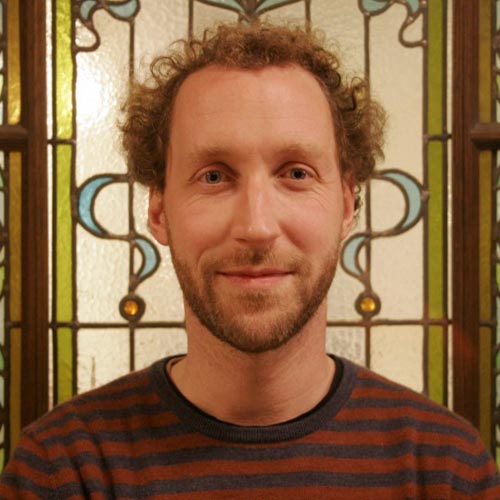
Thijs Bouwknegt is a historian of mass violence and transitional justice at the NIOD Institute for War, Holocaust and Genocide Studies of the Royal Netherlands Academy of Arts and Sciences (KNAW) in Amsterdam, the Netherlands.


